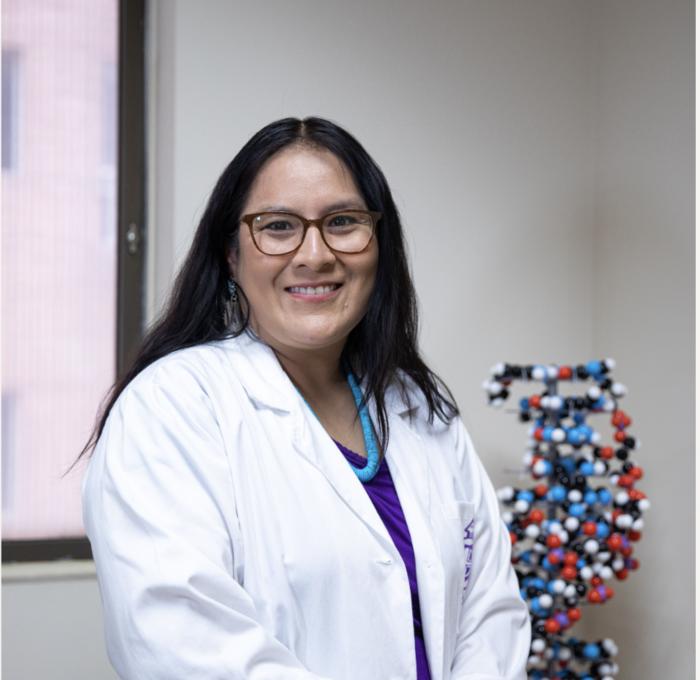In an effort to improve the health of Tribal communities and Indigenous people, the National Institutes of Health (NIH) has awarded $9 million in funding for Native scientists at Arizona State University and elsewhere to create the first Indigenous-led Tribal Data Repository.

Credit: Deanna Dent, Arizona State University
In an effort to improve the health of Tribal communities and Indigenous people, the National Institutes of Health (NIH) has awarded $9 million in funding for Native scientists at Arizona State University and elsewhere to create the first Indigenous-led Tribal Data Repository.
Since the SARS-CoV-2 worldwide pandemic began, global Indigenous communities have been particularly hard hit, with health disparities including lack of access to health care and undue burden of infections leading to increased hospitalizations and higher death rates.
In response, Indigenous researchers and scientists have been working to secure and fund efforts to better understand the impact of COVID-19 and provide data to allow for informed decisions and policy development in addressing the COVID-19 pandemic and potential future pandemics.
The new RADx Tribal Data Repository: Data for Indigenous Implementations, Interventions and Innvovations (RADx TDR D4I) involves six collaborative research awards, including prime awardee Standford University along with Arizona State University, the Native BioData Consortium, Ohio State University, University of California-Santa Cruz, University of Washington, Seattle and University of Wisconsin-Madison.
One of the six awards is to ASU School of Life sciences assistant professor Krystal Tsosie (a member of the Diné/Navajo Nation) will lead a $1.2 million sub-award of the Tribal Data Repository project to research and design the ethical approaches to data sharing, analysis and implementation. In particular, Tsosie focuses on bioethical engagement of Indigenous communities in genomics and data science to build trust. As a whole, her interest is in integrating genomic and data approaches to assess Indigenous variation contributing to health inequities.
As an advocate for Indigenous genomic data sovereignty, she also co-founded the first US Indigenous-led biobank, a 501c3 nonprofit research institution called the Native BioData Consortium, or NativeBio.
“We started NativeBio with a very simple premise, that research on Indigenous peoples’ samples should be led by Indigenous community members and Indigenous scientists,” said Tsosie. “‘For us, by us’ has been our motto to drive researcher questions and to better understand the data. Sometimes outsiders fail to understand factors that contribute to disparaties and health inequities outside the research samples.”
The Native BioData Consortium will be the overall project leader, working with five scholars at premier research universities and at 10 health sites using American Indian and Alaskan Native (AI/AN) public health data to help design ethical approaches to data sharing, data analysis, implementation, policy and legal frameworks. The goal is to more immediately serve Tribal populations following the disproportional impact of COVID-19 in Indigenous communities.
“The award is a landmark decision in support of Indigenous peoples, said Joseph Yracheta (M.S. Purepecha), executive director of NativeBio. “Though apparent, the true extent of COVID-19 disparities among Indigenous people is likely underestimated. This is mostly because of underreporting in the absence of a unified, Indigenous-led data resource to facilitate data collection, interagency cooperation, guide COVID-19 research and subsequent implementations.”
The project adds to called an NIH effort begun 3 years ago to increase the overall understanding of COVID-19 and its effects on American Indian and Alaska Native (AI/AN) communities across the nation, called the Rapid Acceleration of Diagnostics Underserved Populations (or RADx-UP) inititiave.
“The RADx initiative points to the need for tribal sovereign protection of Indigenous data that has been missing since the inception of federal scientific programs,“ said Matt Anderson, associate professor of medical genetics at the University of Wisconsin-Madison (and Eastern Band of Cherokee descent). “Scientists are accountable to Indigenous people in the use of Tribal Data and NativeBio is accountable to Indian Country as being good stewards of their data. This approach models systems and understandings that more closely align with Indigenous mechanisms of community responsibility.”
Specific activies will include education and training programs on best practices for responsible data sharing and access, and constructing a secure repository to support data storage, access, monitoring and sharing of data related to COVID-19 testing and vaccination.
For Tsosie, the new NIH award marks another full circle moment in her early academic career. Tsosie, PhD, MPH, MA, is also an ASU alumna (B.S. microbiology and M.A. applied ethics) and began an appointment in January 2023 to make a difference as the first Indigenous geneticist-bioethicist at Arizona State University.
“I was excited to come back to ASU and serve as an advocate for Indigenous communities, said Tsosie. “I want to bring all of these skill sets related to health inequities and genetic epidemiology back to the communities that I grew up with.”
“Who better to protect our data and improve research about us than Indigenous people themselves?” Tsosie said.




